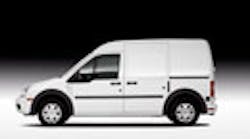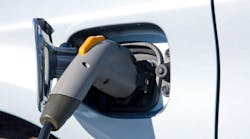Ford's European import, the Transit Connect, is already receiving a bit of a makeover—or, more accurately, a close relative has been born—even before the compact commercial truck goes on sale in the U.S.
The light-duty van, which has sold more than 600,000 units in 58 countries so far, debuts here this summer. And now Ford has announced that, in the first half of 2010, the Transit Connect will be available as an all-electric vehicle as well.
"The new Transit Connect light commercial vehicle with battery electric power represents the next logical step in our pursuit of even greater fuel economy and sustainability," said Derrick Kuzak, Ford's group vp of Global Product Development. "A growing number of our commercial vehicle fleet clients have expressed interest in electrification as a sustainable mobility solution. By leveraging our global team and asset portfolio, we're able to quickly bring this environmentally friendly, strong 'silent type' to market."
Ford's European import, the Transit Connect, is already receiving a bit of a makeover—or, more accurately, a close relative has been born—even before the compact commercial truck goes on sale in the U.S.
The light-duty van, which has sold more than 600,000 units in 58 countries so far, debuts here this summer. And now Ford has announced that, in the first half of 2010, the Transit Connect will be available as an all-electric vehicle as well.
"The new Transit Connect light commercial vehicle with battery electric power represents the next logical step in our pursuit of even greater fuel economy and sustainability," said Derrick Kuzak, Ford's group vp of Global Product Development. "A growing number of our commercial vehicle fleet clients have expressed interest in electrification as a sustainable mobility solution. By leveraging our global team and asset portfolio, we're able to quickly bring this environmentally friendly, strong 'silent type' to market."
The introduction of an all-electric model is due in part to a $55-million tax credit incentive from the Michigan Economic Development Corp., allowing Ford to work with researchers at the University of Michigan and the Massachusetts Institute of Technology to test lithium-ion battery technology for the vehicle.
"I think over the last number of years, we've seen a progression of technologies from lead acid to nickel-metal hydride to lithium-ion batteries," Greg Frenette, manager of Ford's battery-electric vehicle programs, told Fleet Owner. The progression towards lithium-ion "was well underway, but I think it's fair to say that the majority of investment in these batteries was taking place in Korea and Japan."
The tax credit as well as help from the Federal government, Frenette said, has helped make manufacturers, such as Smith Electric Vehicles in the UK, whom Ford is partnering with on the development of the batteries, more willing to invest in the U.S.
The lithium-ion batteries will also power an electric car to be introduced in 2011, and next-generation hybrid vehicles slated for 2012 appearances, Ford said. Because of unique driving characteristics that include storage and usage requirements, each vehicle will have a unique battery.
The all-electric Transit Connect model will maintain most of the same specs as the gas version--135 cu. ft. of cargo space and a 1,600-lb. payload capacity with multiple window configurations from solid side and cargo doors, to side and rear windows for maximum visibility.
The battery, which will require 6 to 8 hours of charging time on a 240-volt outlet for a full charge, will be available in two configurations, either 21 Kwh or 28 Kwh. The vehicle will also be charged by a standard 110-volt outlet, although the charge time will be longer, Frenette said. Vehicle range will be approximately 100 mi., making it an ideal vehicle for urban, stop-and-go applications, he added.
"I think a plumber or contractor would find this vehicle very useful," Frenette said. "Curbside delivery would be a perfect application. And because it can be configured as a left-hand drive vehicle, I think postal applications would be ideal."
Frenette said the Transit Connect is a natural fit for electric power. "The Transit Connect, because of the way it is designed, lends itself to an easier conversion to package [the electrical components] because you have more space under the vehicle," he said
He advised that engineers are still working through challenges, such as dealing with extreme weather conditions that can sap the battery of energy. "We need to be able to mitigate that by getting the battery to the right temperature as quickly as possible," Frenette said, "to ensure the customer gets consistent performance out of the vehicle."
While Ford has not announced pricing for the vehicle (the gas version will retail at $21,475, including destination fees), Frenette said the economics of an all-electric vehicle should make sense as battery prices fall.
"There are opportunities for significant economies of scale as these batteries become committed to vehicle platforms," he said. "We have confidence that the battery economics will continue to improve and that along with government incentives will make these vehicles very viable, not just in the long term, but in the short term."
The new lithium-ion technology offers several advantages over nickel-metal hydrides, Frenette said, including the ability to pack more energy into a smaller battery cell that is also lighter. It also can produce more power and can be tuned to increase power to boost acceleration or to increase energy during extended driving, according to a release from Ford.
A Ford spokesperson did not say whether the company planned a hybrid version of the Transit Connect or whether a diesel engine version would be available at some point.



